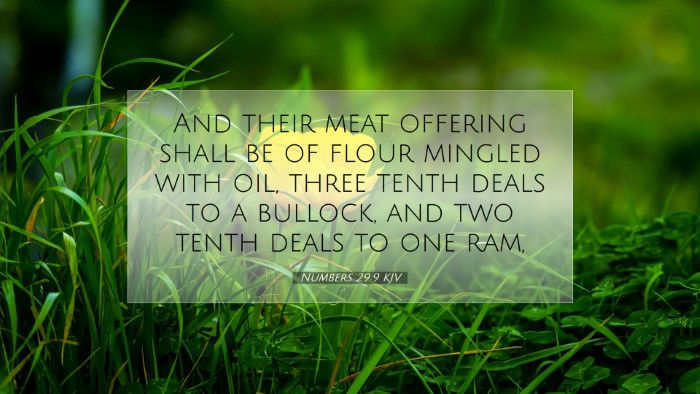Commentary on Numbers 29:9
Verse Text: “And one young bullock, and two rams; they shall be without blemish, and their meat offering shall be of flour mingled with oil, three tenth deals unto one bullock, and two tenth deals unto one ram.”
Introduction
Numbers 29:9 represents a portion of the instructions concerning sacrifices, presenting essential principles of worship and dedication. This commentary synthesizes insights from prominent public domain sources, particularly focusing on the significance of these ancient practices and their theological implications.
Contextual Background
In the Book of Numbers, God outlines various ordinances for the Israelite community, reflecting their covenantal relationship with Him. As part of the religious life of Israel, these offerings underscore the significance of atonement, thanksgiving, and communal participation in worship.
Theological Insights
This verse highlights several theological themes inherent to the sacrificial system.
- The Call to Holiness: The requirement for the sacrifices to be “without blemish” signifies the holiness expected of offerings made to God. According to Albert Barnes, this reflects not only physical purity but also a deeper call for spiritual integrity among the worshippers.
- Covenantal Relationship: Adam Clarke notes that the detailed nature of the sacrifices demonstrates the seriousness of the covenant between Israel and God. Each offering is a reminder of God’s holy nature and His stipulations for relationship with His people.
- The Importance of Intent: Matthew Henry emphasizes that the condition of the heart behind the offering is as important as the physical act itself. Worship rooted in faith and sincere devotion is vital to God, aligning with New Testament principles.
Examination of the Sacrifices
1. The Young Bullock
The bullock represents a significant offering, highlighting its value within the community. Clarke elaborates on this by suggesting that it indicates the seriousness of the occasion for which the sacrifice is being made, often during significant feasts or communal gatherings.
2. The Rams
The inclusion of two rams underscores the gravity of the sacrifice. Barnes notes that the number of animals is representative of the necessity for atonement and the communal effort in seeking God’s favor. It also reflects the leadership's responsibility in leading the people toward God through sacrifices.
3. The Meat Offering
The accompanying flour mingled with oil is significant. This mixture symbolizes the sustenance provided by God and the acknowledgment of His blessings upon the community. It signifies gratitude and dedication, as highlighted by Henry, who points out that the oil symbolizes the anointing of God's presence.
Ritual and Reflection
The ritualistic aspects of these sacrifices serve multiple purposes in the community's spiritual life:
- Commemorative Function: Each sacrifice commemorates God’s faithfulness and the community’s identity as His chosen people.
- Assurance of Atonement: The sacrifices provide assurance of redemption and atonement, encouraging the community to seek closeness with God.
- Unity in Worship: Participation in these communal offerings fosters unity among the people, as they gather around shared acts of worship and obedience.
Practical Applications
For modern believers, the principles from Numbers 29:9 can be translated into practical applications:
- Offering Our Best: We are called to give our best in worship and service, recognizing that God deserves nothing less than our full devotion.
- Heart of Worship: As seen in the sacrificial system, our offerings must arise from a sincere heart of worship, reflecting an authentic relationship with the Lord.
- Witness of Community: Just as the Israelites were called to offer together, today’s churches should engage in collective worship that evidences their unity in Christ.
Conclusion
Numbers 29:9 serves as a poignant reminder of God's holiness and the importance of our covenant relationship with Him. As elaborated by noted commentators, the offerings described are rich with meaning, pointing towards the necessity of both spiritual and physical dedication in our walk with God. The unblemished sacrifices serve not only as adherence to ritual but as profound expressions of faith, gratitude, and community. Let us draw from these insights and ensure that our own lives echo similar devotion and integrity as we seek to honor God in all we do.


